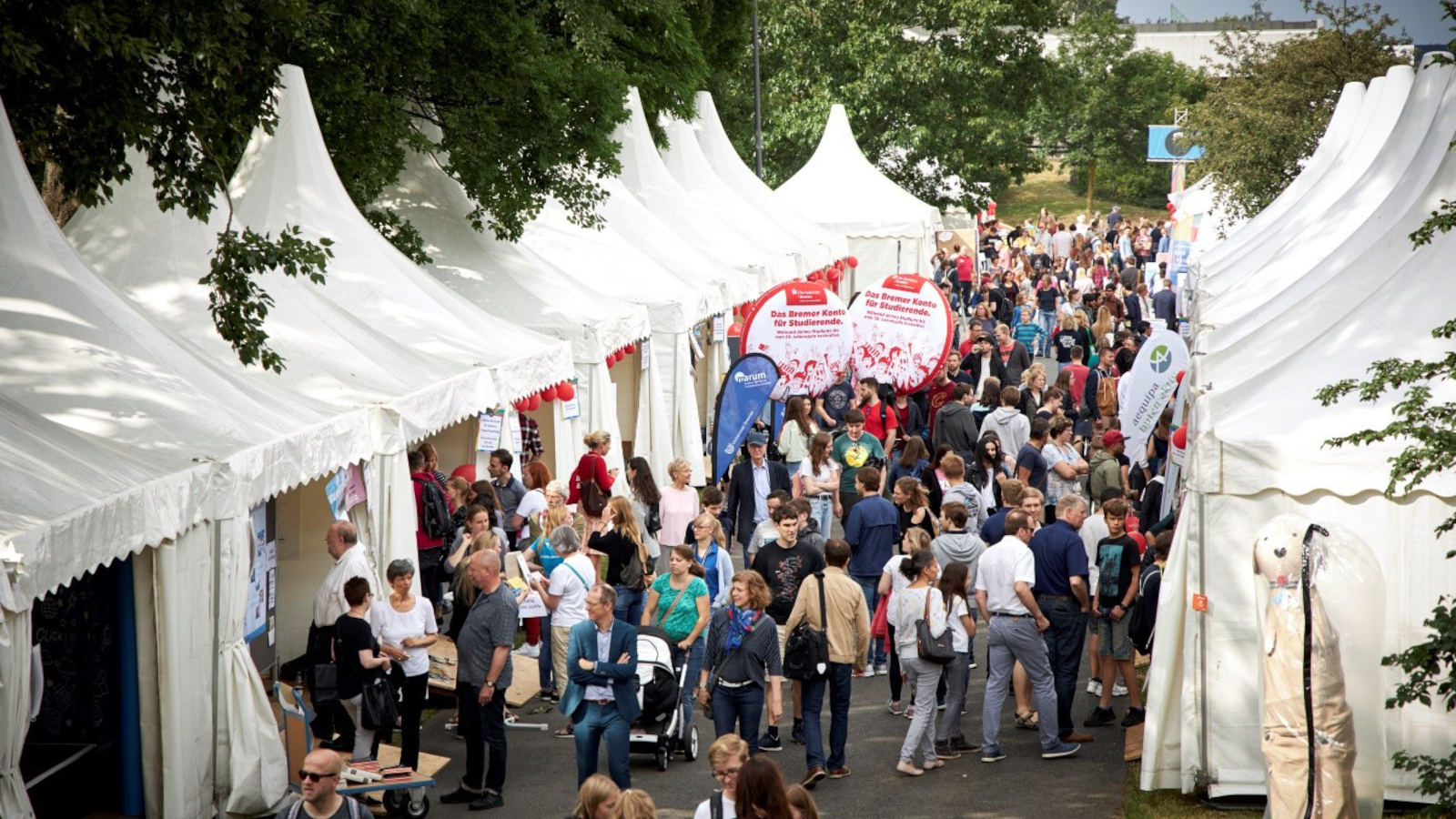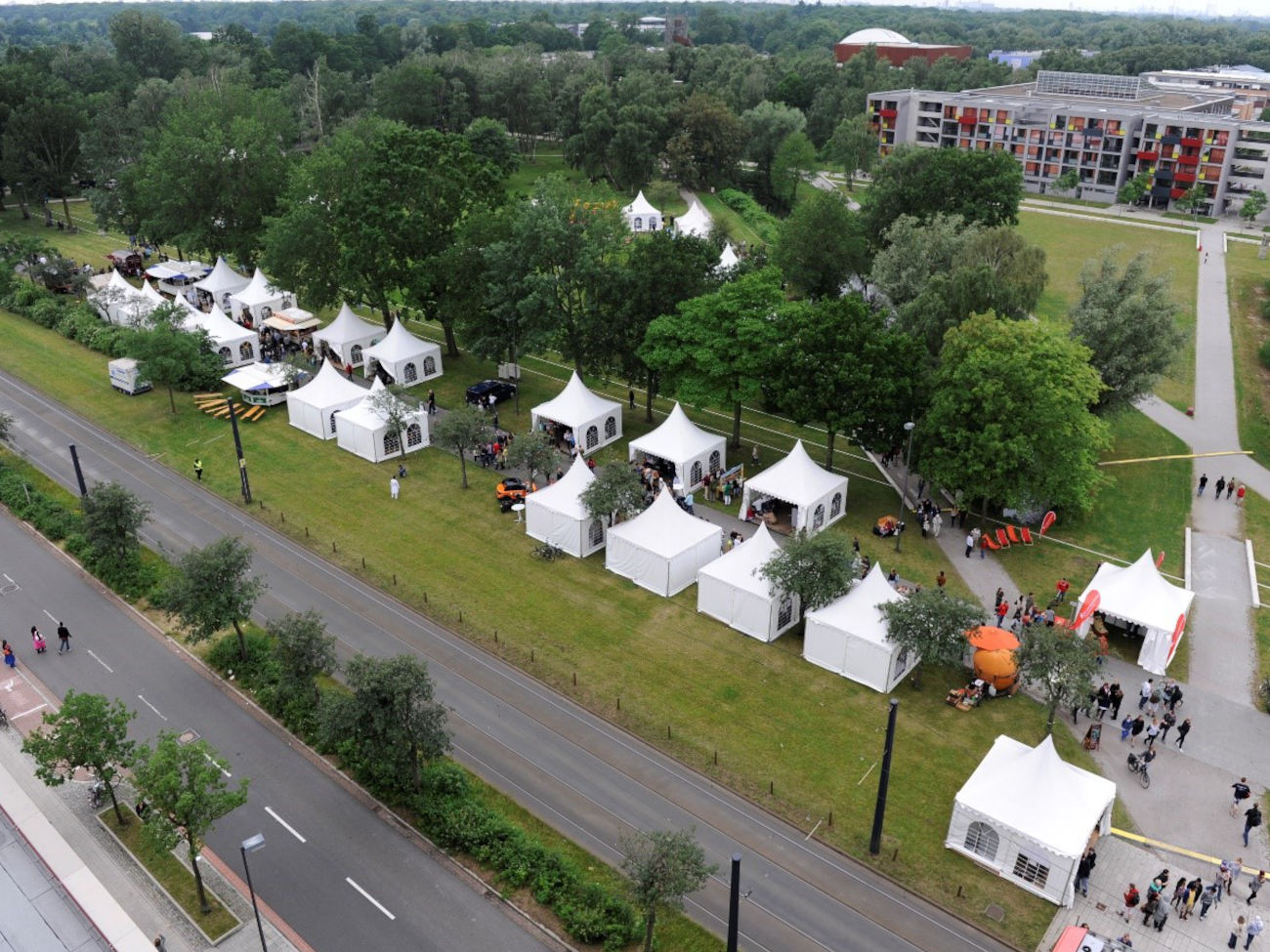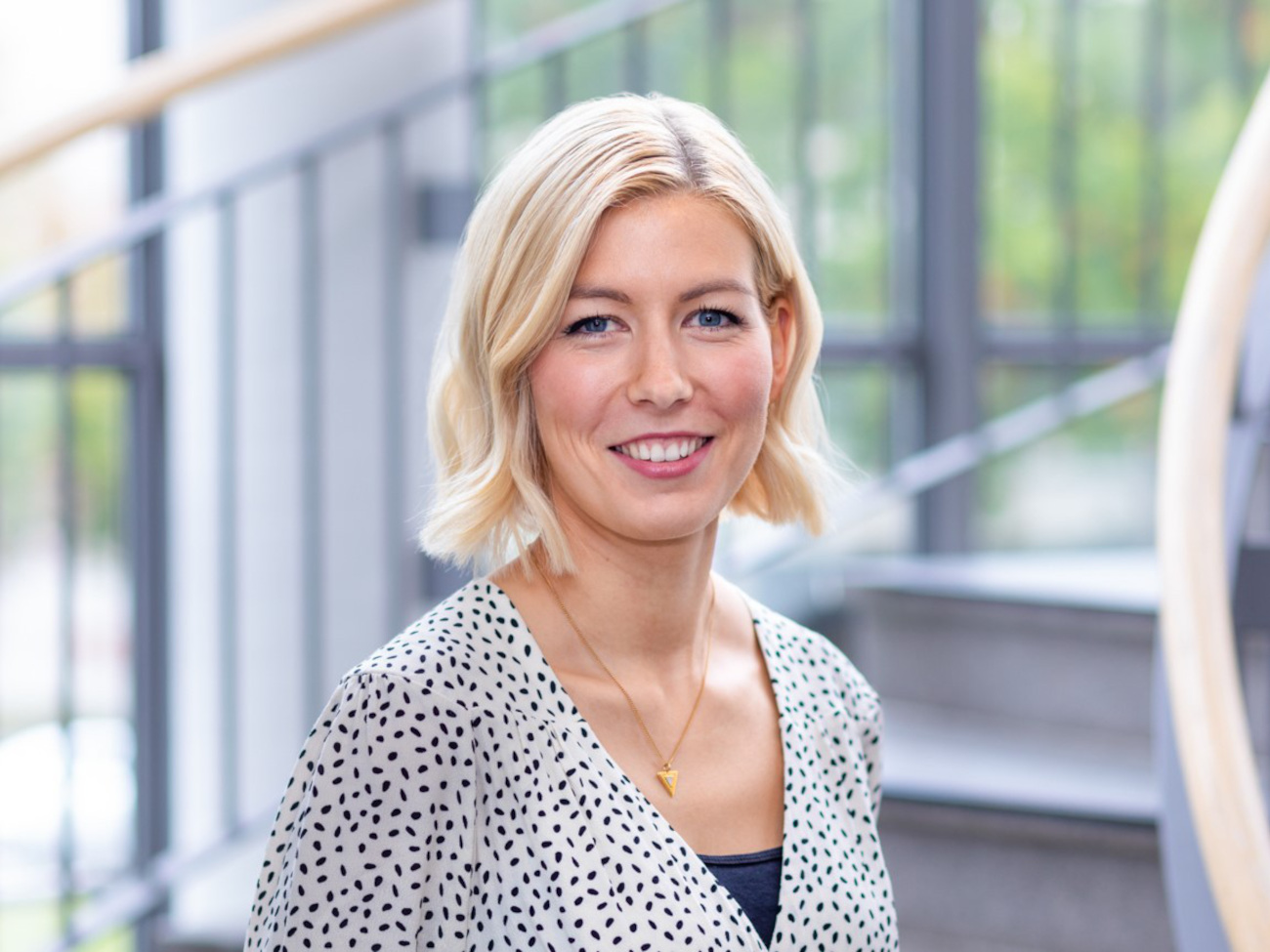
© Martin Bockhacker / Universität Bremen
OPEN CAMPUS Behind the Scenes: Who and What Is Behind the Event?
up2date. interviewed Rebecca Grotheer from the University of Bremen’s Event Management to find out exactly what goes on behind the scenes of the event.
Since 2013, the University of Bremen has hosted its biennial OPEN CAMPUS, which by now attracts around 20,000 visitors. In this interview, coordinator Rebecca Grotheer tells us how the event came about, who is involved in organizing it, and how the university’s values, such as sustainability, are incorporated into the event.
What is OPEN CAMPUS and who is the event for?
OPEN CAMPUS is a big open-air event where we take the university outdoors. Our faculties and institutes present themselves in their own information booths and there are many hands-on activities in the campus park and even a special Children’s Campus. In addition, there is a great on-stage program, exciting talks, and guided tours to some interesting places at the university that the public usually does not have access to. The OPEN CAMPUS program is aimed at a very diverse audience. It always attracts many families who want to spend a nice day with their children. But we also notice that more prospective students are coming to the event. Of course, OPEN CAMPUS is also a highlight for all university members who visit with their families to show them what they are doing at the university.
When and how did the first OPEN CAMPUS originally come about?
I think the impetus at the time came from the former Vice President International and Diversity, Dr. Yasemin Karakaşoglu, who wanted to promote the topic of internationality at the University of Bremen. That is why the motto from the very beginning was “Open Worlds – Share Knowledge”, which was the motto under which the first OPEN CAMPUS was launched in 2013. If you look at the photos from back then, it was quite a different event. It was rather small with very few pagoda tents and, if I remember it correctly, there were only the faculties involved and just one or two institutes at that time. The focus of the event was on a dedicated international campus, a small separate area where the international communities at the University of Bremen presented themselves. Over the years, however, the event has evolved. In 2015, it still featured a separate international campus, but in 2017, the concept changed as the international theme was integrated into the information booths, and the event became much larger overall. In 2013, we counted just under 12,000 visitors, according to the security service provider. In 2015 and 2017, there were around 17,000 to 18,000, and at the last OPEN CAMPUS, there were already around 20,000 visitors.

© Harald Rehling / Universität Bremen
How long have you been involved?
The first OPEN CAMPUS I participated in was the 2015 OPEN CAMPUS. It was at the time of my training at the faculty of Production Engineering – Mechanical and Process Engineering and I helped designing the information booth. The first OPEN CAMPUS I prepared as a member of the Event Management team was in 2017, and that was the first time I really had much on my plate.
How early do you start the planning and how time-consuming is organizing such a big event?
We always start right after each OPEN CAMPUS to set the date for the next OPEN CAMPUS in two years. We have to decide which weekend we are going tol choose in June, so that the event does not coincide with other big events in Bremen and around, such as the Hurricane Festival. We also need to evaluate beforehand whether and how the concept needs to be revamped. Around one and a half to one year in advance, we have our first meetings and the first major tasks are assigned. These are for example ordering the equipment, the pagoda tents, and making appointments with the security and technical service provider. The actual work begins for us as early as half a year in advance. This is when we reach out to the various faculties and institutes. We ask them about their program, who wants to be involved, and clarify more detailed questions and financial matters. In the run up to the two OPEN CAMPUS days, it then becomes particularly stressful for our event management team, as we have to make sure the pagoda tents are set up. Someone must always be on site and available. On the actual two days of OPEN CAMPUS, for us, it means running around, plenty of running around, and a lot of coordination effort. We need to see which artists arrive where and when and, of course, keep an eye that everything is running smoothly.

© Matej Meza / Universität Bremen
How do you organize the event planning? Which groups are involved in the planning teams?
Basically, our Event Management team organizes the whole event, from A to Z, in other words, everything that relates to the setting and outline. The faculties and institutes fill the event with content. In addition, we always work very closely with the Administrative Unit of University Communication and Marketing (KOMMA) on event marketing and with the transfer office, which takes care of event funding. That is basically the core team. Here, we make many decisions in advance, share ideas, but also can seek advice. It is always nice to be able to hear some other opinions and exchange ideas.
Are there any particular topics that are prominent for this year’s OPEN CAMPUS?
One issue throughout the entire OPEN CAMPUS is the topic of sustainability. This issue is reflected in many of the guided campus tours and talks. We also place great emphasis on sustainability as part of the organizational process. For example, when we order printed products, we are careful to select eco-friendly options. We have also taken great care to ensure that all the food stands offer reusable container options. Another topic that is very important to us in the planning team is full accessibility. We have ramps at all the pagoda tents, so that anyone can drive in who is not there on foot. In addition, we have installed access paths with heavy-duty slabs in the meadows of the campus park, so that it is possible to navigate there with a wheelchair. At the same time, we appeal to the different faculties and institutes to consider visitors who cannot see or hear. Another issue we added this year and we would like to emphasize is the topic of awareness. The Anti-Discrimination and Conflict Management Office (ADE) has advised us in depths on the subject. We will put up posters with information about who to contact if you don’t feel safe at the event or need some help. Our support staff, who can easily be recognized by their OPEN CAMPUS T-shirts, as well as the security and catering staff can be approached at any time, and they can always get in touch with us from the organizing team. Unfortunately, we have not been able to establish a professional awareness concept with Safer Spaces and experts on site this year, but we will keep this in mind for 2025.
Who actually gets to decide who will be on stage?
Actually, the first step is to brainstorm within the team and think about what we think will be received well. Then, we pre-select some artists. This year,we additionally exchanged ideas with people from Bremen Next radio, who made some suggestions. We then take our suggestions back to the planning team and check with several people whether all target groups and all tastes are covered. We will then jointly make the final decision.
What has been your personal highlight at OPEN CAMPUS so far and what are you especially looking forward to this year?
Actually, my highlights are always the nighttime concerts; they somehow have a very special atmosphere. Moreover, as an organizer, I have the opportunity to go everywhere – even backstage or in the stage pit – it’s a really cool feeling!